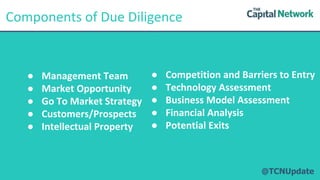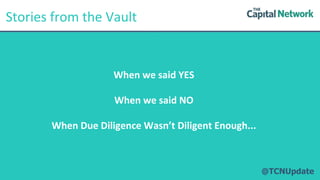Angel Funding Part 2 - Due Diligence April 2018
- 1. thecapitalnetwork.org - @TCNUpdate Angel Funding Part 2- Due Diligence: Navigating People, Processes & Promises Sal Daher Walnut Angels MIT Angels @EmergingMarket @angelinvestbos Barbara Clarke Pipeline Angels Astia Angels @beclarke @PipelineAngels @AstiaGlobal Raza Shaikh Launchpad Venture Group Sky Ventures @razashaikh @LaunchpadVG @skyventuresgrp Deb Kemper Golden Seeds @Deb_Kemper @GoldenSeeds
- 2. @TCNUpdate 1. Prescreening & Screening Referral is the key to entering the process 2. Pitching 10-20 min presentations + Q&A 4. Term Sheet Negotiation & Deal Completion Setting a market price. Lead investor = key 6. Support & Monitor the Investment e.g. Corporate & Advisory Boards What’s the process? 3. Due Diligence Varies between groups & deal leads 7. Exit e.g. IPO, M&A, Dividends/Royalties or Shutdown 5. Syndication & Funding With other local groups or individual Angels/VCs
- 3. @TCNUpdate The point of due diligence is to: ● Give the deal an appropriate (due) level of scrutiny so that the group as a whole can make intelligent investment decisions. As a part of the process, it develops an interested cadre of potential investors. ● Form the team with industry knowledgeable members ● Assess the company so less involved members and syndication members can decide ● Some groups start with a two hour “Deep Dive” which is either an on-ramp into an exhaustive process, or results in a no-go decision Why Do Due Diligence?
- 5. @TCNUpdate ● Lead investor ● Align the investment goals and funds ● Funding strategy ● Metrics ● Milestones ● Human Capital ● Advocate(s) for your company Goal: Funders, CEO and Team Agree
- 8. @TCNUpdate DO set up, organize and populate a data room, e.g., in Dropbox. Developing, archiving and updating this information will help you stay on track. Remember to keep a backup version of your data room before sharing with investors! DO prepare yourself for a 4-6 week usually parallel onslaught of requests, meetings, conversations and materials from the diligence team (while working to keep building your company) DO anticipate & give a great deal of thought to the biggest risks, weak areas facing your company and how you are going to mitigate them. Early stage investors are comfortable with risk, but they want to see that you understand them and have plans to address and reduce them DO listen to and respond professionally and honestly to skepticism and criticism. Assess the validity of the input you receive and revise your plans accordingly. DO project confidence and leadership. Some parts of the diligence process can be ad hoc and some meetings may be challenging. Investors often see how you work with them as part of judging a good working relationship. Similarly for you its to understand your investors and how you see working with them. DON'T put all your eggs in one basket. Use your network to help identify prospective investors who are a good fit, and reach out to as many as possible. DON'T be defensive, dismissive, arrogant, or dishonest, ever, under any circumstances. DON'T run your company based on wishful thinking. Assume things are not going to go as planned, and assume you are going to need more money than you think. DON'T wait until you are almost out of money to raise funds. Dos & Don’ts







